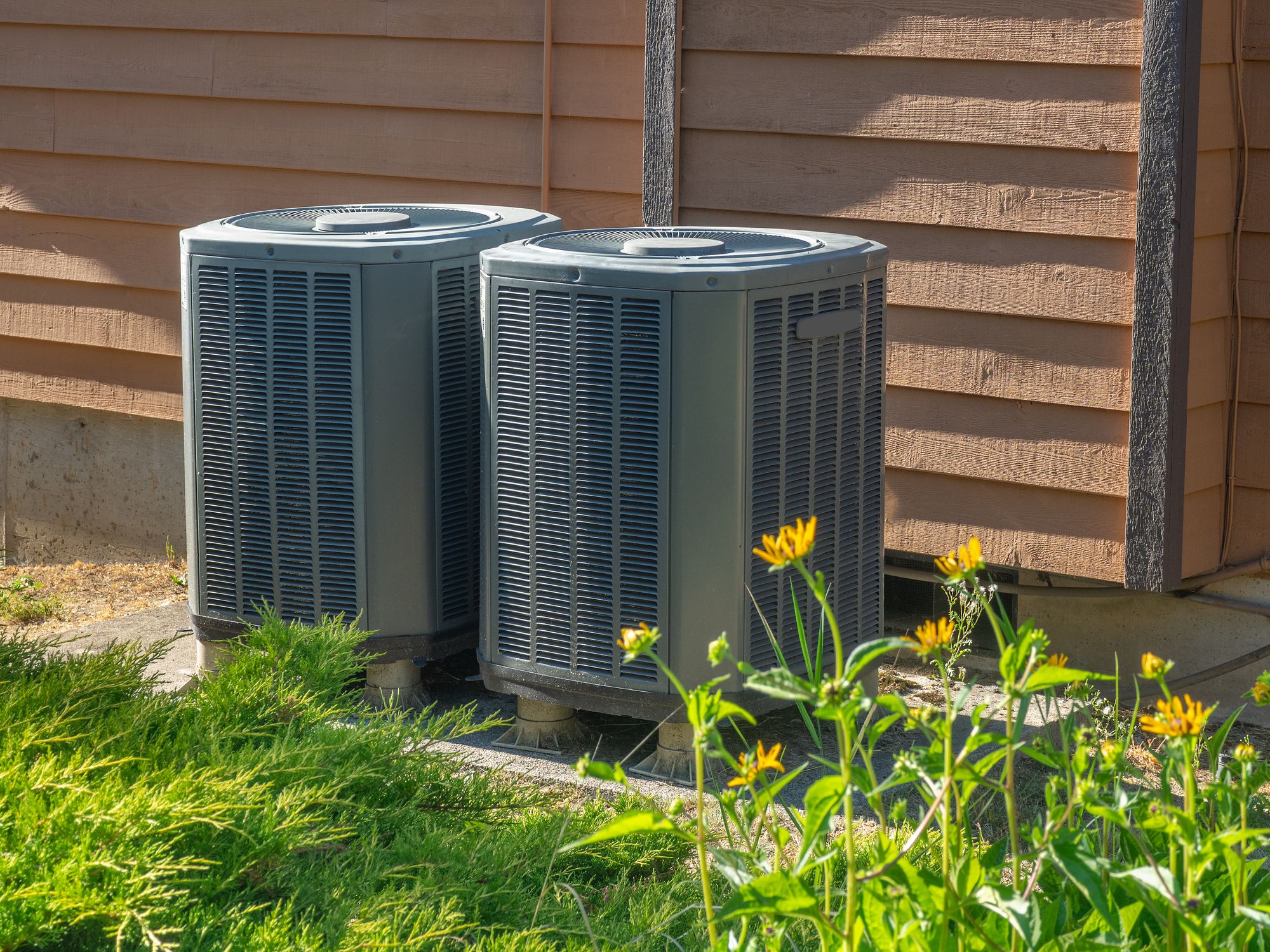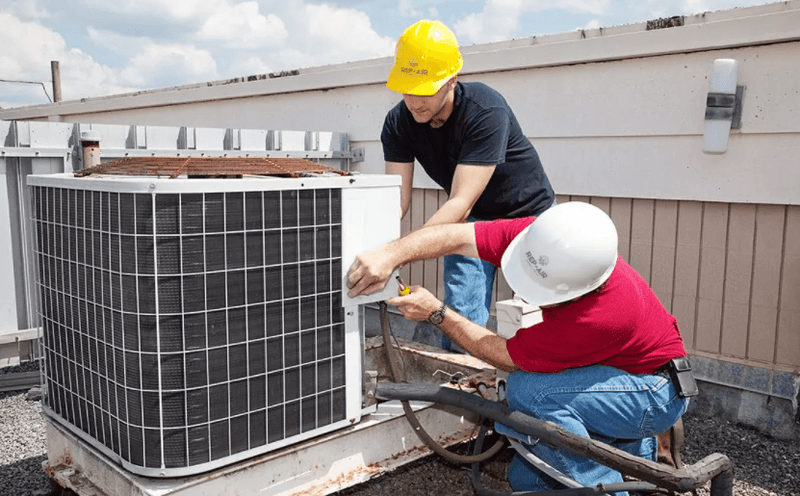Understand how HVAC experts provide anytime support as required
Wiki Article
Discovering the Crucial Parts of an Efficient Heating And Cooling System
An efficient cooling and heating system is improved several important components that operate in harmony. Each part, from the thermostat to the ductwork, plays a vital duty in maintaining convenience and power performance. Recognizing these aspects is vital for maximizing performance and enhancing interior air high quality. As one analyzes these elements, the elaborate connections in between them expose insights into boosting general system efficiency. What details elements add most to this effectiveness?The Duty of the Thermostat in A/c Effectiveness

Although commonly overlooked, the thermostat plays a vital role in the effectiveness of HVAC systems. HVAC experts. This little tool acts as the primary nerve center, controling temperature settings and ensuring excellent comfort within a room. By properly sensing the ambient temperature level, the thermostat communicates with the heating, air, and ventilation conditioning devices to preserve the desired environment
A reliable thermostat minimizes power usage by turning on the cooling and heating system only when necessary, consequently preventing excessive heating or cooling. Modern programmable and wise thermostats boost this efficiency better by permitting users to set schedules and from another location adjust setups, adjusting to everyday routines.
The placement of the thermostat is vital; improper location can lead to imprecise temperature level readings, resulting in inefficient procedure. On the whole, a well-functioning thermostat not just enhances comfort however additionally contributes considerably to power cost savings and the longevity of the HVAC system.
Understanding the Significance of Air Filters
Air filters offer an important function in heating and cooling systems by guaranteeing that the air distributing within an area continues to be clean and healthy and balanced. These filters trap dirt, allergens, and other toxins, stopping them from being recirculated throughout the atmosphere. By recording these fragments, air filters add to boosted indoor air quality, which can significantly profit owners' health, specifically those with allergies or respiratory problems.Additionally, keeping tidy air filters boosts the effectiveness of HVAC systems. Blocked filters can restrict air flow, creating the system to work more challenging to keep preferred temperature levels, bring about boosted power consumption and greater energy costs. Routinely replacing or cleansing filters is a crucial upkeep step that can lengthen the lifespan of cooling and heating devices. Ultimately, recognizing the significance of air filters allows property owners and structure supervisors to take positive procedures to assure a well-functioning, reliable heating and cooling system that promotes a comfortable and risk-free indoor environment.

The Capability of the Furnace and Heatpump
Heating systems and heatpump are critical components of a/c systems, in charge of offering heat during cooler months. Heaters operate by home heating air via combustion or electrical resistance, after that distributing it throughout the home through air ducts. They normally supply rapid heating and can be fueled by natural gas, electricity, or oil, depending on the system kind.Alternatively, heatpump move warmth as opposed to generate it. They extract heat from the outside air or ground, even in reduced temperature levels, and move it inside your home. HVAC experts. This twin performance enables heat pumps to also supply cooling in warmer months, making them functional choices for year-round environment control
Both systems require proper upkeep to guarantee efficiency and longevity. While heating systems succeed in extreme cool, warm pumps can be helpful in modest climates. Recognizing their distinct capabilities help home owners in selecting the most appropriate alternative for their home heating requires.
Discovering the Cooling Device
The cooling unit is a vital element of heating and cooling systems, readily available in numerous kinds to fit different needs. Comprehending the efficiency scores of these units is essential for making notified choices concerning energy usage and price. This area will discover the varied see here now types of a/c unit and make clear how performance ratings effect efficiency.Types of Air Conditioners
While numerous elements influence the choice of a/c systems, comprehending the different types available is crucial for home owners and building managers alike. Central air conditioners are designed to cool entire homes or buildings, utilizing a network of air ducts for airflow. Window devices provide an even more local remedy, ideal for little rooms or solitary rooms. Mobile a/c provide flexibility, enabling customers to relocate the device as needed. Ductless mini-split systems are another choice, incorporating the effectiveness of main systems with the convenience of zoning, as they require no ductwork. Geothermal systems harness the earth's temperature for energy-efficient cooling. Each type comes with unique benefits, making notified options crucial for reliable climate control.
Performance Rankings Explained
Recognizing efficiency rankings is vital for picking the appropriate cooling system, as these metrics give insight right into the system's efficiency and power intake. The most usual ranking for ac system is the Seasonal Energy Performance Proportion (SEER), which determines the cooling output throughout look at more info a regular air conditioning season split by the complete electric power input. A higher SEER shows far better efficiency. In addition, the Power Efficiency Proportion (EER) is utilized for measuring efficiency under particular conditions. An additional crucial metric is the Energy Star qualification, which symbolizes that an unit meets stringent energy effectiveness guidelines. By reviewing these scores, customers can make educated selections that not just optimize comfort however additionally lower power prices and environmental effect.The Significance of Ductwork and Airflow
Efficient ductwork style and airflow administration play important roles in the overall efficiency and performance of cooling and heating systems. Correct ductwork guarantees that conditioned air is dispersed equally throughout an area, minimizing temperature level variations and improving convenience. Well-designed ducts minimize resistance to air flow, minimizing the work on HVAC devices and eventually lowering power usage.Airflow management includes strategically positioning vents and registers to enhance the circulation of air. This avoids common issues such as warm or chilly places, which can happen when airflow is blocked or improperly well balanced. In addition, the best duct products and insulation can additionally enhance performance by reducing heat loss or gain throughout air transit.
An efficient ductwork system not just adds to energy savings however can also prolong the life expectancy of a/c tools by lowering unneeded stress (HVAC experts). Understanding the value of ductwork and air movement is essential for attaining peak Cooling and heating system efficiency.
Regular Maintenance Practices to Improve Performance
Normal maintenance methods are crucial for guaranteeing peak performance of heating and cooling systems. These practices consist look at these guys of regular assessments, cleaning, and needed repair work to maintain the system running efficiently. On a regular basis altering air filters is essential, as clogged filters can block air flow and lower effectiveness. On top of that, professionals ought to inspect and clean evaporator and condenser coils to avoid getting too hot and energy wastage.Yearly expert inspections are additionally recommended, as qualified specialists can determine potential issues prior to they rise. Oiling moving components decreases damage, contributing to a much longer life expectancy for the system. Additionally, ensuring that the thermostat functions appropriately aids in maintaining optimal temperature control.

Often Asked Concerns
How Usually Should I Change My Thermostat?
Thermostats should commonly be changed every 5 to ten years, depending on use and innovation advancements. Routine checks are suggested to guarantee peak efficiency, particularly if experiencing irregular temperature level control or enhanced power costs.What Dimension Air Filter Is Ideal for My A/c System?
The very best size air filter for a HVAC system varies by device design. Typically, it's important to seek advice from the proprietor's handbook or check the existing filter measurements to guarantee peak performance and air top quality.Can I Install a Heatpump Myself?
Setting up a heatpump separately is feasible for competent people, but it calls for understanding of neighborhood codes and electrical systems. Hiring an expert is advised to assure appropriate installation and optimal system efficiency.Just how Do I Know if My Ductwork Is Effective?
To establish ductwork effectiveness, one must inspect for leakages, action air flow at vents, check insulation top quality, and evaluate temperature level distinctions in between supply and return ducts. Professional assessments can provide detailed understandings into general efficiency.What Are Indications My HVAC Requirements Immediate Upkeep?
Indications that a HVAC system needs prompt maintenance include uncommon noises, inconsistent temperatures, boosted power bills, unpleasant odors, and frequent biking. Addressing these concerns immediately can protect against additional damage and guarantee height system efficiency.Air filters offer a vital function in HVAC systems by ensuring that the air flowing within a space remains healthy and tidy. Furthermore, keeping clean air filters boosts the performance of Cooling and heating systems. Ductless mini-split systems are another alternative, incorporating the performance of central systems with the benefit of zoning, as they call for no ductwork. Comprehending performance ratings is essential for picking the best air conditioning system, as these metrics offer insight right into the system's performance and energy consumption. The finest dimension air filter for an A/c system varies by system layout.
Report this wiki page